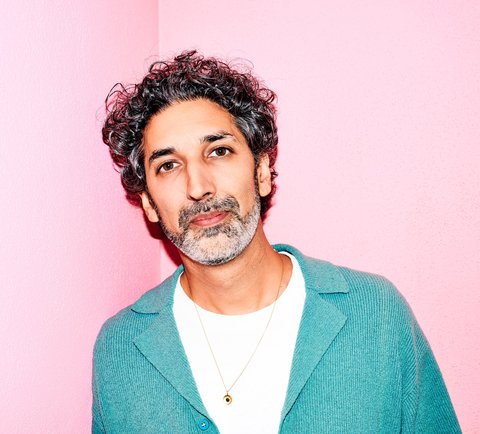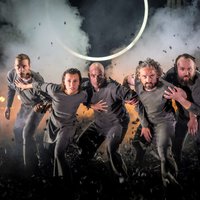»I tried to create mythical music, music that transcends time and, as far as possible, place. I explored many spaces in between, from club-like beats to noisy textures. One children’s song that my mother often sang to me plays a special role – it became a central motif for ›The Odyssey‹.«
Ketan Bhatti composes soundtrack for »The Odyssey«
Using music to express what words cannot convey

Ketan Bhatti is a composer and a 2025 Beethovenfest Fellow. He is the composer of »Die Odyssee« (The Odyssey), a spoken opera based on one of the most famous journeys in cultural history: that of the hero Odysseus. This piece will premiere on 10 September at Beethovenfest, performed by the Beethoven Orchestra and Schauspiel Bonn. We met with Ketan Bhatti ahead of the premiere to chat.
What makes your music for ›The Odyssey‹ special?
I tried to create music that is both mythical and timeless, and that can be played with Western instruments in any location. As well as classical instruments such as strings, woodwind and brass, I also used the Iraqi spike fiddle, the djoze, and in some places, the Armenian duduk. Synthesizers, extended percussion and prepared piano were also added. This combination creates a unique sound. The music incorporates both precisely notated material and freer playing instructions, offering the musicians more creative freedom than a Verdi opera, for example. I explored many spaces in between, from club-like beats to noisy textures. A children’s song that my mother often sang to me plays a special role: in a transformed form, it became a central motif for Penelope and Telemachus.
So, what exactly is a ›spoken opera‹?
To me, it is a form of musical theatre in which instrumental music is given the same importance as opera, except singing is replaced by broken, theatrical speech.
Were there any musical role models or influences that guided you in your work on ›The Odyssey‹?
The musical language that my brother Vivan and I have been developing for many years has always had a significant impact on my solo projects. In particular, we have worked intensively on developing our own musical language, drawing on subcultural trends such as hip-hop and techno, as well as contemporary art music. The way we incorporate elements from other genres rather than simply quoting them is also important. Cymin Samawatie, with whom I direct the Trickster Orchestra in Berlin, has also been a major influence. For over 20 years, we have been working on the decolonisation of contemporary art music and developing trans-traditional new music. This work has also had a significant impact on ›The Odyssey‹!
Did the rehearsals influence your composition?
Enormously. This sets this work apart from musical theatre, where the score usually has to be finished six months before rehearsals begin, meaning the composition process often ends up being completed a year in advance. Director Simon Solberg has a great understanding of music, and so we developed a kind of ping-pong game: he took up my musical suggestions and developed them further in terms of staging and acting, to which I could then respond musically.
What is the added value of having the orchestra visible on stage rather than remaining in the background, as is often the case?
I believe this is a decisive factor: the orchestra becomes the protagonist. The interaction between words and music becomes more immediate and comprehensible to the audience. Even though everyone involved – on and behind the stage – is telling a story (in the broadest sense) together, there is a greater range of interpretations and points of reference. I would call it polyphony, a multi-perspective approach – and that is precisely what interests me most.
Is there a social utopia or dream that your music is associated with?
In my music, I always seek encounters with the supposedly foreign, whether through combining different genres, musical traditions or disciplines. I try to create spaces for interaction. The result of these encounters defies clear categorisation as either ›familiar‹ or ›foreign‹ – fluidity comes to the fore. My working method also follows this approach. It is collaborative and requires sensitivity and adaptability. Or, better still, imitation and transformation. I see great potential in this for social models that enable peaceful coexistence beyond exploitation, racism, sexism and violence.
Das Interview in voller Länge wird im Programmheft zur Produktion veröffentlicht.
Performances at Beethovenfest
- , Schauspielspielhaus Bad Godesberg
Ketan Bhatti & Simon Solberg: The Odyssey
Dance, Performance & Music TheatreEnsemble Schauspiel Bonn, Beethoven Orchester Bonn, Dirk Kaftan
- , Schauspielspielhaus Bad Godesberg
Ketan Bhatti & Simon Solberg: The Odyssey
Dance, Performance & Music TheatreEnsemble Schauspiel Bonn, Beethoven Orchester Bonn, Dirk Kaftan
- , Schauspielspielhaus Bad Godesberg
Ketan Bhatti & Simon Solberg: The Odyssey
Dance, Performance & Music TheatreEnsemble Schauspiel Bonn, Beethoven Orchester Bonn, Dirk Kaftan
- , Schauspielspielhaus Bad Godesberg
Ketan Bhatti & Simon Solberg: The Odyssey
Dance, Performance & Music TheatreEnsemble Schauspiel Bonn, Beethoven Orchester Bonn, Dirk Kaftan
- , Schauspielspielhaus Bad Godesberg
Ketan Bhatti & Simon Solberg: The Odyssey
Dance, Performance & Music TheatreEnsemble Schauspiel Bonn, Beethoven Orchester Bonn, Dirk Kaftan
- , Schauspielspielhaus Bad Godesberg
Ketan Bhatti & Simon Solberg: The Odyssey
Dance, Performance & Music TheatreEnsemble Schauspiel Bonn, Beethoven Orchester Bonn, Dirk Kaftan
- , Schauspielspielhaus Bad Godesberg
Ketan Bhatti & Simon Solberg: The Odyssey
Dance, Performance & Music TheatreEnsemble Schauspiel Bonn, Beethoven Orchester Bonn, Dirk Kaftan
